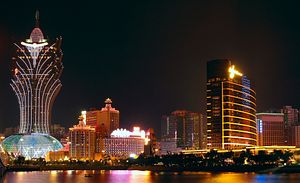Macau is rolling the dice on building more casinos, even while its gaming-dependent economy shrinks.
Formerly one of the world’s fastest growing economies, Macau’s gross domestic product (GDP) shrank by 17 percent in the fourth quarter of 2014, with GDP for calendar 2014 falling into negative territory amid Beijing’s anti-corruption crackdown.
Casino revenues dropped for the 11th straight month in April, down 39 percent to 19.2 billion patacas ($2.4 billion), with high rollers reportedly avoiding the only legalized gambling area in China for fear of being caught in the authorities’ net.
According to an April 24 Reuters report, seven people including government officials are currently being investigated for graft, with the most recent case concerning two transport bureau officials detained on suspicion of taking $2 million worth of bribes from car parking companies.
Other cases have involved the arrest of a chief prison officer and a crackdown on prostitution syndicates, including the high-profile detention of a nephew of former Macau “kingpin” Stanley Ho.
Macau’s anti-corruption boss Cheong Weng Chon has backed Beijing’s fight against crime, saying his Commission Against Corruption bureau would “exert the best efforts to prevent Macau from turning into a transit point or destination for illicit money outflows and corrupt officials fleeing the country.”
High rollers currently account for around 60 percent of total gambling revenues, down from 80 percent two years earlier, while the share prices of Hong Kong listed gaming stocks SJM and Wynn Macau have dived on lower earnings forecasts.
While the city welcomed 31.5 million tourists in 2014, with two-thirds from the mainland, the pace has slowed recently. In March, the number of Chinese visitors to the former Portuguese colony dropped by nearly 18 percent, with Macau’s 35 casinos facing increasing competition from alternative destinations such as Singapore and Australia. Junket operators are moving operations to countries such as the Philippines and Vietnam, with other alternatives including Cambodia, South Korea and Russia.
Worryingly for Macau’s administrators, more than 80 percent of government revenue is derived from gambling taxes, making diversification an economic imperative should the casinos lose their luster.
With annual gambling revenues amounting to an estimated $45 billion – seven times the amount generated by the Las Vegas Strip – the territory has been urged by Chinese officials to “explore a fresh development plan” less reliant on its casinos, even though it may take “20 to 30 years.”
This has reportedly included investing in neighboring Hengqin Island, located at the crossroads of Macau, Guangdong Province, and Hong Kong, with Macau casino operators Galaxy Entertainment and MGM both planning new investments among more than 50 reported projects.
In March, Macau’s Chief Executive Fernando Chui proposed a five-year plan aimed at “stable” casino growth while boosting tourism facilities, including improved airport facilities and services.
“The pace of the economic growth has slowed, prompting us to accelerate economic diversification,” Chui told lawmakers, amid projections that gambling revenues will fall for the second straight year.
New Resorts Planned
Yet like any optimistic gambler, Macau is shrugging off the risks. Two new major integrated resorts are set to open in 2015, with Wynn Macau’s renovation of its gaming floor potentially sparking a “build it and they will come” rally, Bloomberg Intelligence analyst Tim Craighead said.
Craighead told Bloomberg News that the Chinese visitor downturn “may reflect slower economic growth in mainland China,” with tourists set to increase with the opening of new casinos.
Among those planned this year are Galaxy Macau’s phase two expansion, comprising an estimated 150 new gambling tables, with 30 to 40 tables for its Broadway Macau. Melco Crown Entertainment, owned by Hong Kong’s Lawrence Ho and Australia’s James Packer, reportedly plans a film-themed resort, while another three casinos could open in 2016.
“We do think the new resorts will add some draw to mass-market patrons, a jump in new hotels rooms will allow overnight visitors to increase again,” Craighead said in a March 23 Bloomberg News report. “This should gain steam into 2016, especially if Chinese economic stimulus is successful.”
Fitch Ratings expects Chinese VIP gaming revenues to improve in the second half of 2015, amid predictions that the worst of the downturn may be over.
“While the recent operating declines are concerning we are encouraged by the fact that the long-term fundamentals for the higher-margin, lower-volatility mass business remain intact,” the ratings agency said.
Signs that the worst of the downturn may be over have encouraged investors such as emerging markets fund Ossolinski Holdings. “We are preparing for a 100 percent increase in share prices within the next three years,” fund chairman Matthew Ossolinksi told Reuters, saying he aimed to take advantage of Macau casino operators’ current low stock prices.
Michele Matsuda of SI Management told the newswire that this year would mark the start of Macau’s transformation into a center for “ordinary” gamblers instead of just high rollers.
“It is a better balance of non-gaming revenue and as an investment will be much more balanced going forward,” he said. “Now certain stocks are really cheap; other people might have missed it a couple of weeks ago. Now is a good time to see if you want to put capital behind it.”
In 2013, Las Vegas Sands president Robert Goldstein predicted that Macau could become “the world’s first $100 billion market.”
While unlikely for now, should more Chinese and other tourists be lured to the historic gambling enclave Macau’s gamble on growth could yet pay off.

































